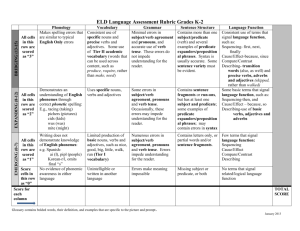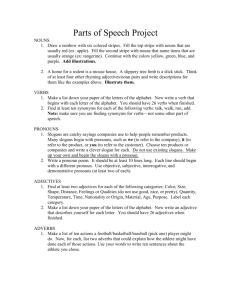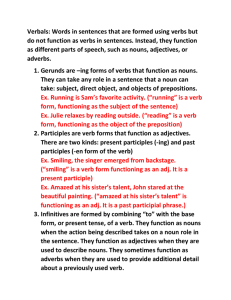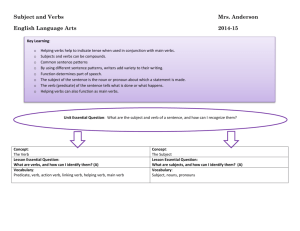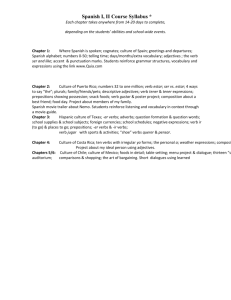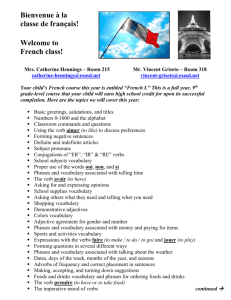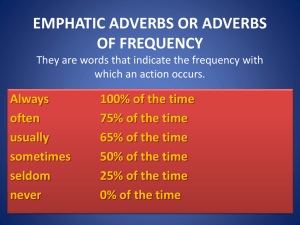Matrix for 3-6 Writing Rubric
advertisement
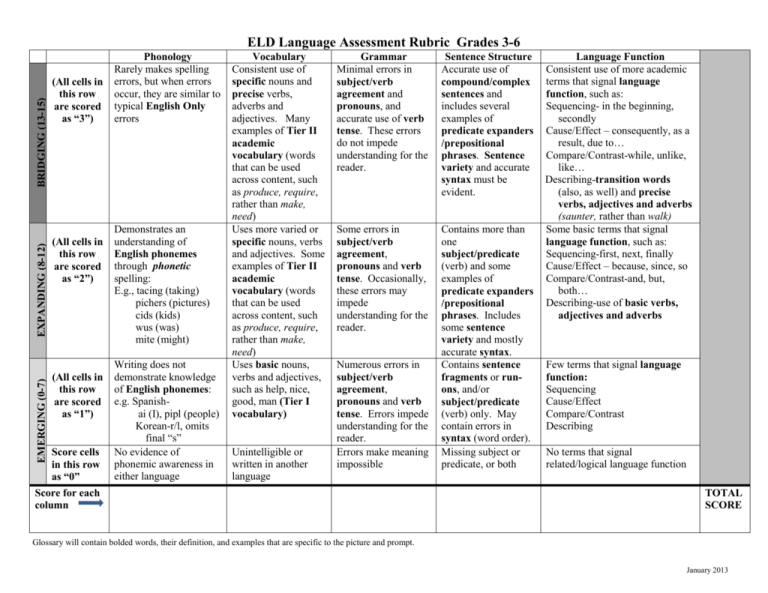
EMERGING (0-7) EXPANDING (8-12) BRIDGING (13-15) ELD Language Assessment Rubric Grades 3-6 (All cells in this row are scored as “3”) (All cells in this row are scored as “2”) (All cells in this row are scored as “1”) Score cells in this row as “0” Phonology Rarely makes spelling errors, but when errors occur, they are similar to typical English Only errors Demonstrates an understanding of English phonemes through phonetic spelling: E.g., tacing (taking) pichers (pictures) cids (kids) wus (was) mite (might) Writing does not demonstrate knowledge of English phonemes: e.g. Spanishai (I), pipl (people) Korean-r/l, omits final “s” No evidence of phonemic awareness in either language Vocabulary Consistent use of specific nouns and precise verbs, adverbs and adjectives. Many examples of Tier II academic vocabulary (words that can be used across content, such as produce, require, rather than make, need) Uses more varied or specific nouns, verbs and adjectives. Some examples of Tier II academic vocabulary (words that can be used across content, such as produce, require, rather than make, need) Uses basic nouns, verbs and adjectives, such as help, nice, good, man (Tier I vocabulary) Unintelligible or written in another language Grammar Minimal errors in subject/verb agreement and pronouns, and accurate use of verb tense. These errors do not impede understanding for the reader. Sentence Structure Accurate use of compound/complex sentences and includes several examples of predicate expanders /prepositional phrases. Sentence variety and accurate syntax must be evident. Some errors in subject/verb agreement, pronouns and verb tense. Occasionally, these errors may impede understanding for the reader. Contains more than one subject/predicate (verb) and some examples of predicate expanders /prepositional phrases. Includes some sentence variety and mostly accurate syntax. Contains sentence fragments or runons, and/or subject/predicate (verb) only. May contain errors in syntax (word order). Missing subject or predicate, or both Numerous errors in subject/verb agreement, pronouns and verb tense. Errors impede understanding for the reader. Errors make meaning impossible Score for each column Language Function Consistent use of more academic terms that signal language function, such as: Sequencing- in the beginning, secondly Cause/Effect – consequently, as a result, due to… Compare/Contrast-while, unlike, like… Describing-transition words (also, as well) and precise verbs, adjectives and adverbs (saunter, rather than walk) Some basic terms that signal language function, such as: Sequencing-first, next, finally Cause/Effect – because, since, so Compare/Contrast-and, but, both… Describing-use of basic verbs, adjectives and adverbs Few terms that signal language function: Sequencing Cause/Effect Compare/Contrast Describing No terms that signal related/logical language function TOTAL SCORE Glossary will contain bolded words, their definition, and examples that are specific to the picture and prompt. January 2013
